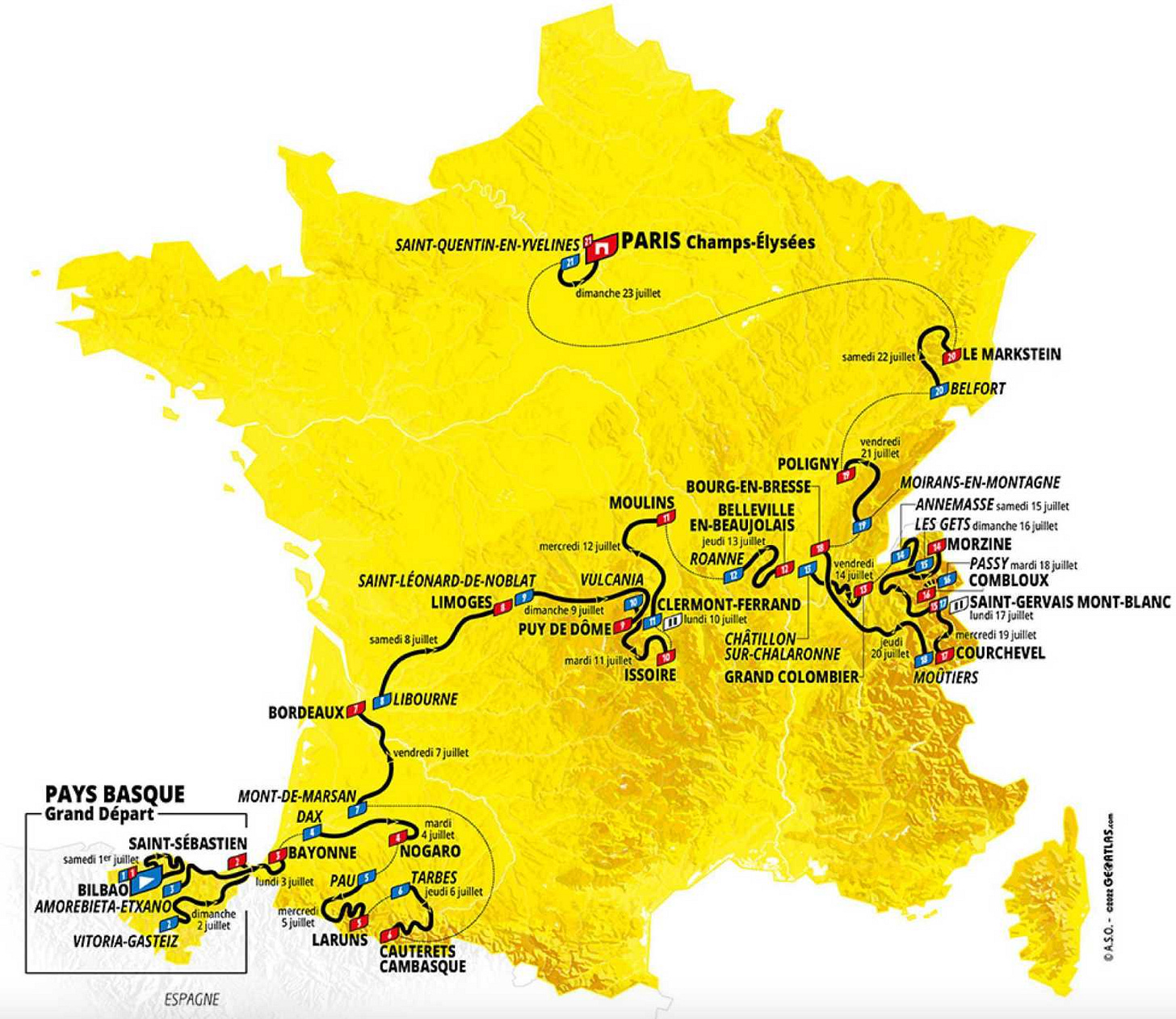Three Initial Reactions From the 2023 Tour de France Route Reveal
The newly-released 2023 Tour route aims to produce an action-packed instant classic, but in reality, the condensed nature of the course could blunt the racing as much as it helps it
The Tour de France organizers, ASO, revealed the route for the 2023 Tour de France yesterday in Paris to much fanfare, with pundits pouring over the available details of each stage in an effort to forecast how the race will play out. Details like the inclusion of all of France’s mountain ranges and a paltry 22 kilometers of individual time trial kilometers have many already forecasting the eventual winner, but something to keep in mind is just how little the route reveals actually tells us about how the race will play out on the road. The route is a great guide, but since things rarely play out as expected and seemingly benign stages can explode the race, and highly anticipated Queen stages can turn into action-less stalemates, it is important to stress that it is the riders and conditions, not the route, that makes the race.
2023 Tour de France Route
Having said that, the route, which essentially tracks the demarcation line between Nazi-occupied and Vichy France during WWII, teases what could be an intriguing battle between Tadej Pogačar, Primož Roglič, Jonas Vingegaard, and perhaps even Remco Evenepoel, with the action concentrated almost exclusively in the mountains, especially with a hard foreign start in the Basque Country.
Additionally, sprinters, like Mark Cavendish (if he ever signs with a team for 2023), will likely not be happy with what they see since the long traditional flat transitions are all but eliminated by the concentrated route, and even the easiest of sprint stages contain challenging hills and difficult finishes.
2023 Tour de France Stage List
Stage 1: Bilbao > Bilbao (182km)-hills
Stage 2: Vitoria-Gasteiz > San Sebastián (209km)-hills
Stage 3: Amorebieta-Etxano > Bayonne (185km)-flat
Stage 4: Dax > Nogaro (182km)-flat
Stage 5: Pau > Laruns (165km)-mountains
Stage 6: Tarbes > Cauterets (145km)-mountains
Stage 7: Mont-de-Marsan > Bordeaux (170km)-flat
Stage 8: Libourne > Limoges (201km)-hills
Stage 9: Saint-Leonard-de-Noblat > Puy de Dôme (184km)-mountains
Rest Day #1
Stage 10: Saint-Ours-les-Roches > Issoire (167km)-hills
Stage 11: Clermont-Ferrand > Moulins (180km)-flat
Stage 12: Roanne > Belleville-en-Beaujolais (169km)-hills
Stage 13: Châtillon-sur-Chalaronne > Grand Colombier (138km)-mountains
Stage 14: Annemasse > Morzine (152km)-mountains
Stage 15: Les Gets > Saint-Gervais Mont Blanc (180km)-mountains
Rest Day #2
Stage 16: Passy > Combloux (22km)-ITT
Stage 17: Saint-Gervais Mont Blanc > Courchevel (166km)-mountains
Stage 18: Moûtiers > Bourg-en-Bresse (186km)-hills
Stage 19: Moirans-en-Montagne > Poligny (173km)-flat
Stage 20: Belfort > Le Markstein (133km)-mountains
Stage 21: Saint-Quentin-en-Yvelines > Paris (115km)-flat
Breakdown by Stage Type:
8 mountain stages
4 summit finishes
6 flat(ish) stages
6 hilly stages
1 time trial
22 kilometers total
10.5 climbing kilometers
1) On paper, the exceptionally small number of individual time trial kilometers, makes this a ‘climbers’ Tour
Keep reading with a 7-day free trial
Subscribe to Beyond the Peloton to keep reading this post and get 7 days of free access to the full post archives.


